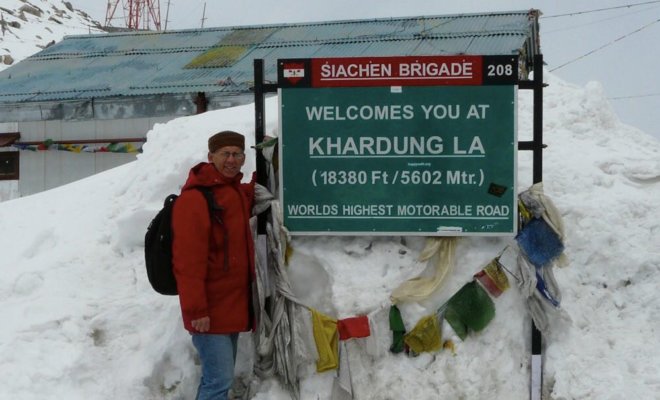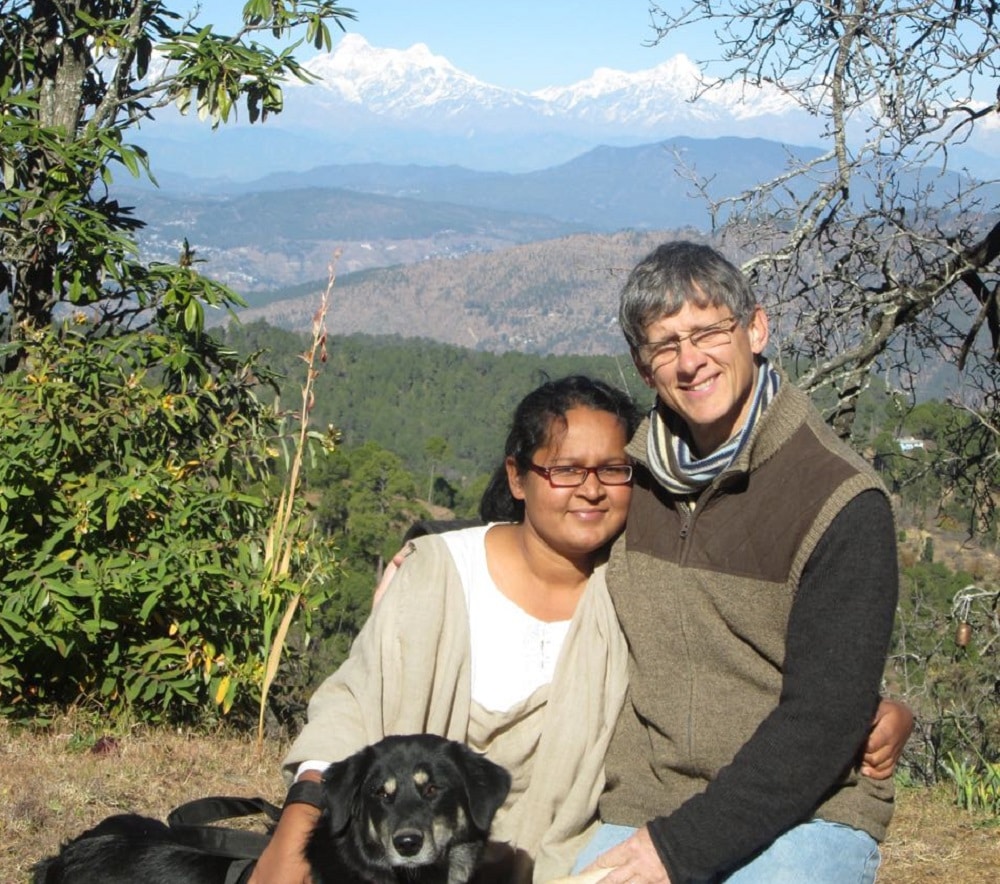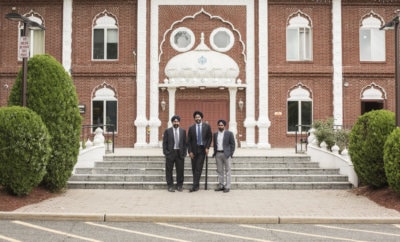Expat Voices
Expat Voice: Rendezvous with the Mountains

Keith Goyden at Khardung La Pass in Ladakh
Keith Goyden from New Jersey feels that living in the hills has its own set of challenges but waking up to mountains everyday is a refreshing change from the city life.
It was the quest to know India, its challenges and landscape that brought Keith Goyden from New Jersey, United States, to India.
“I have been living in India on a permanent basis for around 10 years and now feel that I am a part of the community,” he says.
The 59-year-old academician, who now lives in a small hamlet called Chatola near Mukteshwar in the Nainital district of Uttarakhand, feels that living in the hills has its own set of challenges, but waking up to the mountains is a refreshing change from the busy lives that city dwellers lead.
Goyden tells Little India about his keenness to know rural societies in India, and about being inspired by the way of life of people in the country:
Recuperating in Delhi
The first time I came to India was in 1995. I was transitioning in my career and had a gap year, so I traveled across north India and Nepal. It was then that I fell ill in Nepal and came to New Delhi to recuperate. During that phase I had also traveled to Rajasthan and that planted the seed in my mind to come back to India for a longer time. I went back to the United States and came back to Jodhpur in 1998 for a study program. I spent a lot of time in Rajasthan between 1999 and 2005, and my plans to stay in India crystallized during that period, following which I moved to Uttarakhand.
In the Lap of Nature
I live in a small village, and even though it is an incredibly beautiful place, living in the hills has its own set of challenges. I decided to stay in the hills because my academic work is focused on the region. Moreover, I wanted to be a part of the community. I feel that these challenges are not detractors and the infrastructure in rural India is still in transition. For starters, the basics like providing electricity and water is a must. Despite the hardships, people in the hills are extremely hard working and caring. They offer all they can to help their neighbors when someone is going through a rough patch.

Keith Goyden with his wife Chicu Lokgariwar and their pet near their home at Chatola village in Uttarakhand.
Being a Part of the Community
The opportunity to meet and hear the renditions of the Manganiyar singers — folk singers of Rajasthan — in 1998 is what shaped my approach towards the rural societies of India. My mentor in those days asked me to listen to their songs to know more about the societal issues and he would translate their songs to me. It was a rich experience that really opened my perspective.
Now in the hills, I have met many inspiring people who are working to help the community in the terrain and I feel that they are the key mentors for the younger generation. Recently, I have started a workshop where I teach children the tricks of baking with the local produce. It is an endeavor to make children appreciate the produce of the region.
Guests from America
I host many undergraduate students from the United States who come to the hills in Uttarakhand to study the challenges in a rural setting. Initially, when they come here, they struggle with the food and the bathroom, since they stay with some families in the village, but at the end of the course when they undergo the entire experience of having a bucket bath, the lack of central heating and eating what the family cooks, they go back feeling enriched and knowing so much more about the people of India.

Endless Paperwork
It took me nine months to get a driver’s license. It is small things like this that really put me off. All the talk about reducing bureaucracy and making things quicker needs to be effective at the grassroots level. I feel that a lot still needs to be done in this sphere.
Pros of Speaking Broken Hindi
I was once driving and was stopped by a traffic cop for a minor traffic infraction. I said something to him in my clumsy Hindi and was immediately let off. However, I saw many others committing the same mistake and being given a harsher punishment. That incident taught me to appreciate the privilege that I had unwantedly got.
In the past, when I would be sitting in a library, strangers would come up to me and ask me if I could help them with pursuing higher education in the United States. These were people who did not know me and had never spoken to me earlier. All this really humbled me and I have begun to respect the privileges that I have.

Keith Goyden giving bakery lessons to children
An Adventurous Foodie
My wife, Chicu Lokgariwar, and I cook food from all parts of India, whether it is from Nagaland, Tamil Nadu or Karnataka. I like to eat different sorts of cuisine and try everything, unlike many from the West who avoid eating spicy food.
I have also traveled to some amazing places in India, like Ladakh, Goa, some parts of Karnataka, Nagaland, Bihar, and Uttar Pradesh. My wife and I try to eat the local produce of the region and put up with a family living there to get to know more about the place.
Diverse India
With all the travel I have done in India, the one realization that has hit me is how each region is different from the other. The United States pales out in comparison to the diversity that India has. India is a model for many countries to have a democracy with such incredible diversity.
The interview has been condensed and edited.
Expat Voice is regular column on expats in India. Email us at expat@littleindia.com to nominate yourself or another expat for the column.




You must be logged in to post a comment Login